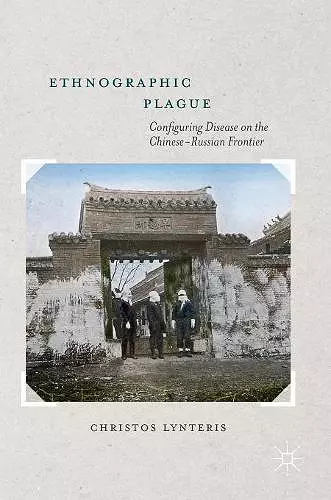Ethnographic Plague
Configuring Disease on the Chinese-Russian Frontier
Format:Hardback
Publisher:Palgrave Macmillan
Published:11th Aug '16
Currently unavailable, and unfortunately no date known when it will be back

"This manuscript represents a significant contribution to the history of medicine, to epidemiology, and to medical anthropology in general. Through its careful reading of the third plague pandemic it shows not only how complex was the epidemic itself, but also how the understanding of the epidemic was mediated by synergistic factors, including diverse political, social, biomedical, and academic prejudices." (David Napier, University College London, UK) "Christos Lynteris has written an absorbing and ground-breaking account of a central episode in the third great plague pandemic, the epidemic of 1910-11 in Manchuria and the Chinese-Russian borders. Using the lens of an historical ethnographer, Lynteris provides a fascinating and sensitive reassessment of contemporary attitudes towards the supposed and actual transmitters of the disease - in which the marmot plays a starring role - and uses this to challenge the continuing debates and received wisdom about plague in the post-laboratory era." (John Henderson, Birkbeck, University of London, UK) "In the world of emerging infectious diseases, public health experts often turn to social anthropologists to provide local knowledge on the risk perception of zoonoses. With this fascinating enquiry on the transmission of plagues by marmots in Mandchuria one century ago, Christos Lynteris shows that this call is not new, and that it takes contradictory forms. This book is an important contribution to the theoretical reflection on interspecies barrier, and puts the contemporary question of zoonoses at the heart of a comparative anthropology, beyond the various calls for ethnography." (Frederic Keck, Laboratoire d'Anthropologie Sociale, France)
Challenging the concept that since the discovery of the plague bacillus in 1894 the study of the disease was dominated by bacteriology, Ethnographic Plague argues for the role of ethnography as a vital contributor to the configuration of plague at the turn of the nineteenth century.
Challenging the concept that since the discovery of the plague bacillus in 1894 the study of the disease was dominated by bacteriology, Ethnographic Plague argues for the role of ethnography as a vital contributor to the configuration of plague at the turn of the nineteenth century. With a focus on research on the Chinese-Russian frontier, where a series of pneumonic plague epidemics shook the Chinese, Russian and Japanese Empires, this book examines how native Mongols and Buryats came to be understood as holding a traditional knowledge of the disease. Exploring the forging and consequences of this alluring theory, this book seeks to understand medical fascination with culture, so as to underline the limitations of the employment of the latter as an explanatory category in the context of infectious disease epidemics, such as the recent SARS and Ebola outbreaks.
ISBN: 9781137596840
Dimensions: unknown
Weight: 3896g
199 pages
1st ed. 2016